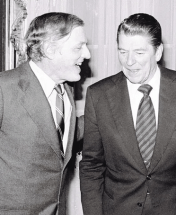
Dr Frankenstein, call your office. You are about to be put out of business.
American scientists in Oregon have put young Victor to shame. They’ve found a new way of producing sapient human beings, one that involves no hanky-panky, in fact no human contact whatsoever.
They harvest DNA from people’s skin cells, fertilise it with sperm, and Frankenstein is your uncle: there we have it, a human embryo. The story was first broken in Nature Communications and then migrated to other journals via the BBC website.
The journals politely give credit where it’s due, as in: “Normally, reproduction happens when a man’s sperm meets a woman’s egg, creating an embryo that grows into a baby after nine months, as reported by BBC.”
Crikey. So that’s where babies come from? Who coulda thunk. Thank you, BBC, for opening our eyes to that startling fact.
Oh well, yes, but not quite. That’s where babies used to come from, normally. Now they’ll come abnormally, from a tiny cell scraped off human skin. From there they’ll go into a test tube, replacing in vivo with in vitro. A fertilised cell will become an embryo, then presumably a baby, then an adult, then even perhaps a stem cell biologist, but only if his genetic makeup allows for no scruples.
When they grow up, those vitreous babies will be able to describe themselves proudly with the words in the title above. And they won’t even have to refer to the glass jars as ‘Mum and Dad’.
All such dystopic discoveries are invariably hailed as science’s gift to mankind. This skin flick is no exception.
The BBC is effusive: Now even old women can have babies. Splendid news. I for one look forward to watching octogenarian ladies push prams down the King’s Road. That conveyance could also act as a Zimmer frame, which is an extra benefit any way you look at it.
Infertile women and impotent men can all rejoice: help is on the way. And you can forget about women: fertile or otherwise, they’ve been made redundant.
Now two homosexual men can have a baby genetically related to both of them. One man’s skin can be used to produce an egg, which will then be fertilised by the other man’s sperm. Don’t ask me how, I’m way out of my depth in this field.
This discovery, gushes the BBC, “re-writes the rules of parenthood”. I’ll say. It definitely does that, in spades.
“We achieved something that was thought to be impossible,” says Prof Shoukhrat Mitalipov, the director of the Oregon Health and Science University’s centre for embryonic cell and gene therapy.
Applause all around, the audience stands up and chants “Test tube, born and bred!” until every throat goes hoarse. The scientific journals where I’ve read the story echo the ovations as best they can, although they feel duty-bound to commiserate that so far the success rate is lamentably low, nine per cent or thereabouts.
It’ll take at least another decade before Grannies can become Mummies, and two men can have babies they can each rightfully call their own. I just hope I’m still around to take part in the celebratory festivities.
However, as a lifelong proponent and occasional practitioner of the archaic, so-called ‘normal’, reproduction method, I have to admit to feeling some sadness. And as a commentator, I must feign surprise at a notable omission in every story I’ve read on the subject.
My surprise is only feigned because deep down I’m feeling none. It’s par for the course that apolitical journals and the politically woke BBC would only talk about the feasibility of this method, never giving a second’s thought to its morality.
They never do: the prevailing thought is that, if something can be done, it must be done. For example, experiments in interbreeding humans and apes have been going on for decades.
The idea is to produce a ‘pithecanthropus’, thereby plugging the missing-link hole in Darwin’s theory. I’m not privy to any technical, or shall we say amorous, details of such experiments, but I do know that they stubbornly continue to fail. This, though the primates involved share 98 per cent of their DNA with humans.
Apparently, it’s the remaining two per cent that account for our humanity, and no number of people copulating with chimpanzees will change that. But trust scientists, such as Prof Mitalipov, the pride of Kazakhstan and Oregon, to deliver another slap in the face of decency.
As decency is defined in our Judaeo-Christian civilisation, I hasten to add. It insists that human life is made in the likeness and image of God, not in the image and likeness of a skin cell reared in a jar.
Someone living within that civilisation, whether or not a religious believer, feels sorry for infertile women who can’t have babies the normal way. For many it’s a tragedy they suffer, but suffering is an unavoidable part of life, not to mention the starting point of our civilisation. Re-writing the rules of parenthood (and thereby re-defining humanity) isn’t a price worth paying for relieving those women’s distress.
Cry for them, pray for them (if such is your wont), feel their pain by all means. But let whatever is left of traditional propriety survive – even if it means no grannies using baby prams as Zimmer frames.
However, more and more people find themselves, willingly, enthusiastically and often unwittingly, outside our civilisation. Such people see nothing wrong with a world in which Mary Shelley’s fantasies read like reportage. A world inhabited by Igors, run by Frankensteins and sooner or later destroyed by them.
Sooner rather than later, I’d suggest, but that’s progress for you.








